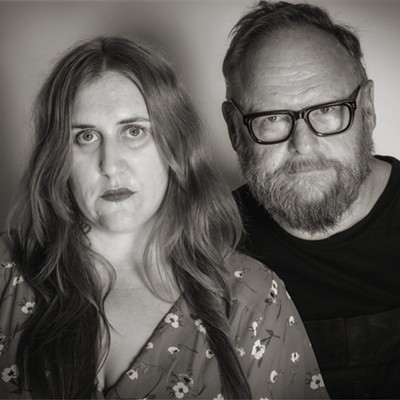"I was sitting in a windowless room in Bushwick, Brooklyn, and it was the middle of March, and I just had this vision of me sitting under a palm tree somewhere and getting the hell out of New York," said Tod A in a recent interview.
So in 2005, he sold all of his stuff, put the few things he couldn't part with in storage and flew to India.
"I was fed up with my life in America, and so I wanted to go where I didn't know what the next day was going to hold, instead of a long, seemingly never-ending stretch of days with George Bush looming large in my consciousness," explained Tod A.
His goal was to travel by land from Delhi to Istanbul; he made it as far as the Khyber Pass on the border of Afghanistan, and ended up getting to Turkey and Israel later.
The trip itself was life-changing for Tod A: He started writing music again, and found musicians along the way to help lend a Middle Eastern and South Asian tone to his songs.
"The initial goal wasn't to make a record; it was to travel and to find a new home, really," he said. "I knew I wanted to see the world, and the record was sort of a happy byproduct of that."
About half of the songs on the record were already written before Tod A left, he said, but as he traveled, they developed and took shape. "If anything ... forgive the pun, but it's a record of my mental state as I was traveling," he said.
"There's such a feeling on the record, and of the sequence of it, of needing to get the hell out, of going somewhere very foreign and being a stranger in a strange place and looking back at home, sometimes with sadness and sometimes with anger, and then also a sense of looking forward into the unknown," he said.
"Borneo" introduces all of these sentiments: "Gonna set my sails for the virgin soil," Tod A sings. "You know I don't wanna die for the price of oil." Israeli musicians play guitars, drums and the trombone, and the whole song sounds giddy and exuberant.
But the next song, "This Is My Life," has Tod A singing bitterly, "I lost my home and I lost my wife / This is no joke, this is my life." The Pakistani musicians who play on it make what could be just another sad song about the loss of love and hope into something transcendent: The traditional Pakistani instruments play the melody and rhythm loudly and then quietly, expanding the emotions further than a mere guitar could take them.
Using different musicians and instruments has always been a part of Firewater. Many of the songs on The Golden Hour have musicians from Israel, Pakistan, Turkey and India all blending together, but Tod A and Firewater drummer/The Golden Hour producer Tamir Muskat (also of Balkan Beat Box) are the two consistent threads that tie the record together.
"I'm no Pavarotti. I'm working within limitations with my voice, and that kind of goes a long way in holding it together," said Tod A. "There's only so much I can do. But at the same time, we really don't want to repeat ourselves, and so we try to strike a balance between trying out new things and hopefully not being too eclectic. If anything, we erred on the side of being too eclectic."
The Golden Hour is definitely eclectic, but too eclectic, it's not: It sounds of many places, but it also sounds like an American rock record infused with worldly emotions expressed through different instruments.
Unlike other American musicians who write songs in other cultural styles and sometimes end up washing out the sound they're trying to re-create, Firewater's use of ethnic instrumentation feels a lot less colonialist (or as Tod A put it, it's not in a "Paul Simon sort of way.") The songs themselves aren't trying to be Pakistani, or Turkish, or Israeli, or Indian: They're still consistently in the style of Tod A and Firewater, but with the beat played on a djembe or a dumbek instead of a snare or floor tom. Instead of sounding like Firewater's versions of other countries' musical styles, The Golden Hour sounds like other countries' versions of Firewater's songs.
"I've always gotten off on the mystery of what happens when you take a song and give it to other people and see what they do with it," said Tod A. "There's any number of ways you can present a song. ... It's how people deliver them, the emotion they deliver them, what they bring to them."
The instrumental "Bhangra Bros," for example, has a rhythm and feel unmistakably Bhangra, but with banjo and trombone--if the same piece of music was played with different instruments, it might sound like the furthest thing ever from Bhangra. "Hey Clown" hops with Middle Eastern rhythm, but lyrically and structurally is pure punk. "Already Gone" begins with swinging banjo, then the trombone turns it into a gypsy freak-out, and finally, guitarist Uri Kinrot infuses the song with lament. The songs on The Golden Hour take on the stylistic imprints of the musicians and instruments playing them.
"I had so much fun working this way on this last record that I think I'm going to do it again," he said.
After Firewater finishes touring, he's planning to pick up the Delhi-to-Istanbul trip where he left off, in Afghanistan. "We'll see what's happening in Kabul in eight months, but if not, I suppose I can always cheat and go from Iran," he said. "But I'm also getting into Greek music, so I might go to Greece and Turkey instead."
Either way, the music should sound great--and hopefully, it'll be a little less politically bitter.








